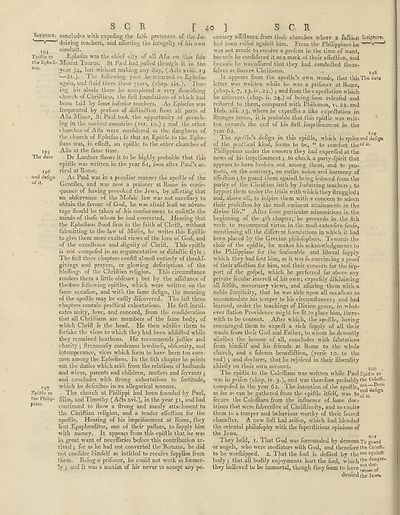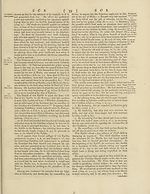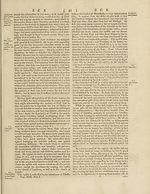Encyclopaedia Britannica, or, a Dictionary of arts, sciences, and miscellaneous literature : enlarged and improved. Illustrated with nearly six hundred engravings > Volume 19, Scripture-SUG
(46) Page 40 - SCR
Download files
Complete book:
Individual page:
Thumbnail gallery: Grid view | List view

Setipture.
194
Epiftle to
tha Ephefi-
T9S
The date
T96
and defign
of it.
. *97
Epiftle to
the Philip-
pians.
SCR
concludes with expofing the falfe pretence
daizing teachers, and afferting the integrity of his own
conduit.
Itphefus was the chief city of all Aha on this fide
Mount Taurus. St Paul had palled through it in the
year 54, but without making any Itay, (Acts xviii. 19
•—21.). The following year he returned to Ephefus
again, and llaid there three years, (chap, xix.). Dur¬
ing his abode there he completed a very flourillung
church of Chriftians, the firft foundations of which had
been laid by fome inferior teachers. As Ephefus was
frequented by perfons of dill in it ion from all parts of
Alia Minor, St Paul took the opportunity of preach¬
ing in the ancient countries (ver. 10.) 5 and the other
churches of Alia were confidered as the daughters of
the church of Ephefus; fo that an Epiftle to the Ephe-
fians was, in effeil, an epiftle to the other churches of
Alia at the fame time.
Dr Lardner (hows it to be highly probable that this
epiftle was written in the year 61, foon after Paul’s ar¬
rival at Rome.
As Paul was in a peculiar manner the apoftle of the
Gentiles, and was now a prifoner at Rome in confe-
quence of having provoked the Jews, by aflerting that
an obfervance of the Mofaic law was not neceffary to
obtain the favour of God, he was afraid leaft an advan¬
tage ftiould be taken of his confinement to unfettle the
minds of thofe whom he had converted. Hearing that
the Ephefians flood firm in the faith of Chrift, without
fubmitting to the law of Mofes, he writes this Epiftle
to give them more exalted views of the love ef God, and
of the excellence and dignity of Chrift. This epiftle
is not compofed in an argumentative or didadic ftyle ;
The firft three chapters confift almoft entirely of thankf-
givings and prayers, or glowing deferiptions of the
bleftings of the Chriftian religion. This circumftance
renders them a little obfeure •, but by the afliftance of
the two following epiftles, which were written on the
fame oecafion, and with the fame defign, the meaning
of the apoftle may be eafily difeovered. The laft three
chapters contain practical exhortations. He firft incul¬
cates unity, love, and concord, from the confideration
that all Chrifiians are members of the fame body, of
which Chrift is the head. He then advifes them to
forfake the vices to which they had been addifted while
they remained heathens. He recommends juftice and
charity ; ftrenuoufly condemns lewdnefs, obfeenity, and
intemperance, vices which feem to have been too com¬
mon among the Ephefians. In the 6th chapter he points
out the duties which arife from the relations of hufhands
and wives, parents and children, mafters and fervants j
and concludes with ftrong exhortations to fortitude,
which he deferibes in an allegorical manner.
The church at Philippi had been founded by Paul,
Silas, and Timothy (Afts xvi.), in the year 51, and had
continued to lliow a ftrong and manly attachment to
the Chriftian religion, and a tender afi’eflion for the
apoftle. Hearing of his imprifonment at Rome, they
fent Epaphroditus, one of their paftors, to fupply him
with money. It appears from this epiftle that he was
in great want of neceflaries before-this contribution ar¬
rived } for as he had not converted the Romans, he did
not confider himfelf as intitled to receive fupplies from
them. Being-a prifoner, he could not work as former¬
ly ; and it was a maxim of his never to accept any pe-
[ 4° ] SCR
of the Ju- cuniary afflftance from thofe churches where a fa^lioh Scripture,
had been raifed againft him. From the Philippians he
was not averfe to receive a prefent in the time of want,
becaufe he confidered it as a mark of their affedion, and
becaufe he was .allured that they had conducted them-
felves as fincere Chriftians. IoS
It appears from the apoftle’s owm words, that this The date
letter was written while he wras a prifoner at Rome,
(chap. i. 7, 13. iv. 22.) ; and from the expectation which
he difeovers (chap. ii. 24.) of being foon releafed and
reftored to them, compared with Philemon, v. 22. and
Heb. xiii. 13. where he expreffes a like expedation in
ftronger terms, it is probable that this epiftle was writ¬
ten towards the end of his firft imprifonment in the
year 62. _ _ . ,09
The apoftle’s defign in this epiftle, which is quite and defign
of the pradical kind, feems to be, “ to comfort thect it*
Philippians under the concern they had expreiled at the
news of his imprifonment ; to check a party-fpirit that
appears to have broken out among them, and to pro¬
mote, on the contrary, an entire union and harmony of
affedion ; to guard them againft being feduced from the
purity of the Chriftian faith by Judaizing teachers ; to
fupport them under the trials with which they ft niggled*
and, above all, to inlpire them with a concern to adorn
their profeflion by the moft eminent attainments in the
divine life.” After fome particular admonitions in the
beginning of the 4th chapter, he proceeds in the 8th
verfe to recommend virtue in the moft extenfive fenfe,
mentioning all the different foundations in w hich it had
been placed by the Grecian philofophers. Towards the
clofe of the epiftle, he makes his acknowledgments to
the Philippians for the feafonable and liberal fupply
which they had fent him, as it was fo convincing a proof
of their affedion for him, and their concern for the fup¬
port of the gofpel, which he preferred far above any
private fecular intereft of his owm * exprefsly difclaiming
all felfifh, mercenary views, and affuring them with a
noble fimplicity, that he was able upon all occafions to
accommodate his temper to his circumftances * and had
learned, under the teachings of Divine grace, in what¬
ever ftation Providence might fee fit to place him, there¬
with to be content. After which, the apoftle, having
encouraged them to exped a rich fupply of all their
wants from their God and Father, to whom he devoutly
aferibes the honour of all, concludes with falutations
from himfelf and his friends at Rome to the whole
church, and a fblemn benedidion, (verfe io. to the
end) *, and declares, that he rejoiced in their liberality
chiefly on their own account. 20C
The epiftle to the Coloflians was written while Paul Epiftle to
was in prifon (chap. iv. 3.), and was therefore probably the Colofli-
compofed in the year 62. The intention of the apoftle, ans''7I?^te
as far as can be gathered from the epiftle itfelf, was to ^lt * l°n
fecure the Coloflians from the influence of fome doc¬
trines that were fubverfive of Chriftianity, and to excite
them to a temper and behaviour worthy of their facred
charader. A new fed had arifen, which had blended
the oriental philofophy with the fuperftitious opinions of
the Jews.
20T
They held, 1. That God was furrounded by demons To guard
or angels, who were mediators with God, and therefore the Coloffi-
to be worfhipped. 2. That the foul is defiled by the ans againft
body * that all bodily enjoyments hurt the foul, whichthe ^anger‘
they believed to be immortal, though they feem to have ^ies°of
denied the Jews.
194
Epiftle to
tha Ephefi-
T9S
The date
T96
and defign
of it.
. *97
Epiftle to
the Philip-
pians.
SCR
concludes with expofing the falfe pretence
daizing teachers, and afferting the integrity of his own
conduit.
Itphefus was the chief city of all Aha on this fide
Mount Taurus. St Paul had palled through it in the
year 54, but without making any Itay, (Acts xviii. 19
•—21.). The following year he returned to Ephefus
again, and llaid there three years, (chap, xix.). Dur¬
ing his abode there he completed a very flourillung
church of Chriftians, the firft foundations of which had
been laid by fome inferior teachers. As Ephefus was
frequented by perfons of dill in it ion from all parts of
Alia Minor, St Paul took the opportunity of preach¬
ing in the ancient countries (ver. 10.) 5 and the other
churches of Alia were confidered as the daughters of
the church of Ephefus; fo that an Epiftle to the Ephe-
fians was, in effeil, an epiftle to the other churches of
Alia at the fame time.
Dr Lardner (hows it to be highly probable that this
epiftle was written in the year 61, foon after Paul’s ar¬
rival at Rome.
As Paul was in a peculiar manner the apoftle of the
Gentiles, and was now a prifoner at Rome in confe-
quence of having provoked the Jews, by aflerting that
an obfervance of the Mofaic law was not neceffary to
obtain the favour of God, he was afraid leaft an advan¬
tage ftiould be taken of his confinement to unfettle the
minds of thofe whom he had converted. Hearing that
the Ephefians flood firm in the faith of Chrift, without
fubmitting to the law of Mofes, he writes this Epiftle
to give them more exalted views of the love ef God, and
of the excellence and dignity of Chrift. This epiftle
is not compofed in an argumentative or didadic ftyle ;
The firft three chapters confift almoft entirely of thankf-
givings and prayers, or glowing deferiptions of the
bleftings of the Chriftian religion. This circumftance
renders them a little obfeure •, but by the afliftance of
the two following epiftles, which were written on the
fame oecafion, and with the fame defign, the meaning
of the apoftle may be eafily difeovered. The laft three
chapters contain practical exhortations. He firft incul¬
cates unity, love, and concord, from the confideration
that all Chrifiians are members of the fame body, of
which Chrift is the head. He then advifes them to
forfake the vices to which they had been addifted while
they remained heathens. He recommends juftice and
charity ; ftrenuoufly condemns lewdnefs, obfeenity, and
intemperance, vices which feem to have been too com¬
mon among the Ephefians. In the 6th chapter he points
out the duties which arife from the relations of hufhands
and wives, parents and children, mafters and fervants j
and concludes with ftrong exhortations to fortitude,
which he deferibes in an allegorical manner.
The church at Philippi had been founded by Paul,
Silas, and Timothy (Afts xvi.), in the year 51, and had
continued to lliow a ftrong and manly attachment to
the Chriftian religion, and a tender afi’eflion for the
apoftle. Hearing of his imprifonment at Rome, they
fent Epaphroditus, one of their paftors, to fupply him
with money. It appears from this epiftle that he was
in great want of neceflaries before-this contribution ar¬
rived } for as he had not converted the Romans, he did
not confider himfelf as intitled to receive fupplies from
them. Being-a prifoner, he could not work as former¬
ly ; and it was a maxim of his never to accept any pe-
[ 4° ] SCR
of the Ju- cuniary afflftance from thofe churches where a fa^lioh Scripture,
had been raifed againft him. From the Philippians he
was not averfe to receive a prefent in the time of want,
becaufe he confidered it as a mark of their affedion, and
becaufe he was .allured that they had conducted them-
felves as fincere Chriftians. IoS
It appears from the apoftle’s owm words, that this The date
letter was written while he wras a prifoner at Rome,
(chap. i. 7, 13. iv. 22.) ; and from the expectation which
he difeovers (chap. ii. 24.) of being foon releafed and
reftored to them, compared with Philemon, v. 22. and
Heb. xiii. 13. where he expreffes a like expedation in
ftronger terms, it is probable that this epiftle was writ¬
ten towards the end of his firft imprifonment in the
year 62. _ _ . ,09
The apoftle’s defign in this epiftle, which is quite and defign
of the pradical kind, feems to be, “ to comfort thect it*
Philippians under the concern they had expreiled at the
news of his imprifonment ; to check a party-fpirit that
appears to have broken out among them, and to pro¬
mote, on the contrary, an entire union and harmony of
affedion ; to guard them againft being feduced from the
purity of the Chriftian faith by Judaizing teachers ; to
fupport them under the trials with which they ft niggled*
and, above all, to inlpire them with a concern to adorn
their profeflion by the moft eminent attainments in the
divine life.” After fome particular admonitions in the
beginning of the 4th chapter, he proceeds in the 8th
verfe to recommend virtue in the moft extenfive fenfe,
mentioning all the different foundations in w hich it had
been placed by the Grecian philofophers. Towards the
clofe of the epiftle, he makes his acknowledgments to
the Philippians for the feafonable and liberal fupply
which they had fent him, as it was fo convincing a proof
of their affedion for him, and their concern for the fup¬
port of the gofpel, which he preferred far above any
private fecular intereft of his owm * exprefsly difclaiming
all felfifh, mercenary views, and affuring them with a
noble fimplicity, that he was able upon all occafions to
accommodate his temper to his circumftances * and had
learned, under the teachings of Divine grace, in what¬
ever ftation Providence might fee fit to place him, there¬
with to be content. After which, the apoftle, having
encouraged them to exped a rich fupply of all their
wants from their God and Father, to whom he devoutly
aferibes the honour of all, concludes with falutations
from himfelf and his friends at Rome to the whole
church, and a fblemn benedidion, (verfe io. to the
end) *, and declares, that he rejoiced in their liberality
chiefly on their own account. 20C
The epiftle to the Coloflians was written while Paul Epiftle to
was in prifon (chap. iv. 3.), and was therefore probably the Colofli-
compofed in the year 62. The intention of the apoftle, ans''7I?^te
as far as can be gathered from the epiftle itfelf, was to ^lt * l°n
fecure the Coloflians from the influence of fome doc¬
trines that were fubverfive of Chriftianity, and to excite
them to a temper and behaviour worthy of their facred
charader. A new fed had arifen, which had blended
the oriental philofophy with the fuperftitious opinions of
the Jews.
20T
They held, 1. That God was furrounded by demons To guard
or angels, who were mediators with God, and therefore the Coloffi-
to be worfhipped. 2. That the foul is defiled by the ans againft
body * that all bodily enjoyments hurt the foul, whichthe ^anger‘
they believed to be immortal, though they feem to have ^ies°of
denied the Jews.
Set display mode to:
![]() Universal Viewer |
Universal Viewer | ![]() Mirador |
Large image | Transcription
Mirador |
Large image | Transcription
Images and transcriptions on this page, including medium image downloads, may be used under the Creative Commons Attribution 4.0 International Licence unless otherwise stated. ![]()
| Permanent URL | https://digital.nls.uk/192695880 |
|---|
| Attribution and copyright: |
|
|---|
| Description | Ten editions of 'Encyclopaedia Britannica', issued from 1768-1903, in 231 volumes. Originally issued in 100 weekly parts (3 volumes) between 1768 and 1771 by publishers: Colin Macfarquhar and Andrew Bell (Edinburgh); editor: William Smellie: engraver: Andrew Bell. Expanded editions in the 19th century featured more volumes and contributions from leading experts in their fields. Managed and published in Edinburgh up to the 9th edition (25 volumes, from 1875-1889); the 10th edition (1902-1903) re-issued the 9th edition, with 11 supplementary volumes. |
|---|---|
| Additional NLS resources: |
|

